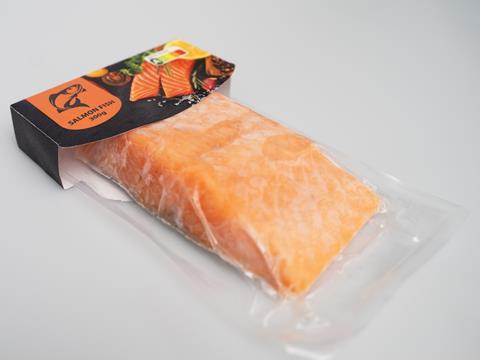
SÜDPACK’s new Multifol Extreme base film is set to offer thinner and more lightweight thermoforming packaging in vacuum and MAP applications for fish products; it will reportedly facilitate lower costs and emissions across the value chain.
Multifol Extreme is designed to offer high puncture resistance and sealing performance, with SÜDPACK stating that the film is well-suited to fatty, protein-rich, or sharp-edged products like fresh or frozen fish. It is said to remain reliably sealed in the case of surface contamination, maintaining high packaging quality and low leakage.
High barrier properties, especially concerning oxygen, have also been applied to counteract the susceptibility of fish products to oxidation. As such, the products are anticipated to achieve a longer shelf life.
At a thickness of 200 µm, the film weighs 20% less than its predecessor, Multifol NT, and approximately 30% less than conventional PA/PE structures – all without sacrificing product protection, says SÜDPACK. With a thinner film, each reel contains more material, which results in fewer reel changes and less machine downtime.
Lighter-weight packages are also anticipated to lower storage and transport costs, and fish and seafood processing and packaging companies are expected to save resources and cut down on their reliance on fossil feedstock – and, in turn, their carbon footprint. By adding a lidding film from the Multifol family, producers can apparently achieve even higher material savings.
SÜDPACK concludes that the film provides ‘outstanding’ thermoforming properties with large drawing depths and good processability on all common thermoforming packaging machines.
A similar development came from Amcor back in January. Its recyclable PrimeSeal and DairySeal Recycle-Ready Thermoforming Films with memory retention technology are intended for meat, fish, and dairy products, claiming to offer an 80% reduction in carbon footprint compares to existing PE and PA films.
adapa Group’s PE-based skin film range, meanwhile, is geared towards premium meat and fish products as a high-performance, aesthetically pleasing, and processable addition to its SkinFresh Top brand.
Coveris has just released its own mono-material thermoforming solution, MonoFlex Thermoform. It is available in polyethylene and polypropylene versions and is reportedly free from nylon, also claiming to reduce carbon emissions throughout its life cycle.
If you liked this article, you might also enjoy:
The L’Oréal approach to packaging sustainability
What steps is Apple taking to make its packaging more sustainable?
How did Brazil achieve its 100% aluminium can recycling rate – and can it be replicated in the EU?
Experts have their say on the EU’s Packaging and Packaging Waste Directive revisions














No comments yet